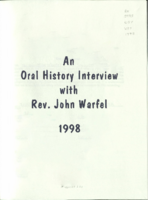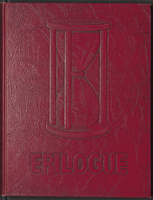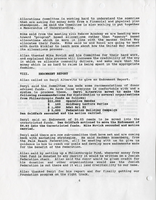Search the Special Collections and Archives Portal
Search Results

Transcript of interview with Randall "Randy" Walker by Stefani Evans, November 2, 2017
Date
Archival Collection
Description
In twenty-first-century, urban America, Randall "Randy" Walker is one of the few fathers who can say he raised his children in the same house in which he grew up. Walker did not inherit the house at 443 Republic Street, in Henderson. Instead, Walker bought the house from his parents after he graduated from Brigham Young University in Utah, worked with Exxon Oil Company in Houston, returned to Southern Nevada to work in his first government job as a budget analyst for Clark County, and sold the house he previously owned. He did not have to move his wife and children far-their previous home was at 442 Republic Street, directly across from his parents. In this oral history, Walker shares why his family came to Henderson in 1952, describes growing up in the small town of his youth, and tells what it was like to have his father as his high school Spanish teacher. He focuses on his career in government and how he applied his accountant mindset to the various positions he held with Clark County, the Las Vegas Metropolitan Police Department, the City of Las Vegas, and McCarran Airport. Along the way he shares his experiences with large governmental building projects such as the first 911 Call Center, the Downtown Transportation Center, the Regional Justice Center, and at McCarran Airport, the D v Gates, Terminal 3, and the airport tunnel and connector roads. He explains how his work with these various projects brought him into interaction with such diverse fields as architecture, accounting, construction, design, infrastructure, public art, public safety and local, state, and national politics. Throughout, Walker displays the collegial and common-sense approach to government, leadership, and problem solving that grounds the decisions he makes and explains why Richard Bunker wanted him at Clark County, why Clark County leaders recruited him to be county manager (and why that did not happen), and why McCarran Airport was able to accommodate without interruption Southern Nevada's record-breaking growth in residential and tourist traffic, and why, even in his absence, McCarran was the first major airport allowed to reopen following the 2001 September Eleventh terror attacks.
Text

Transcript of interview with Joel Bergman by Stefani Evans and Claytee D. White, August 03, 2016
Date
Archival Collection
Description
Born in 1936, architect Joel Bergman spent his childhood in Venice, California, the son of Edythe Klein and Harry Bergman, a baker who later turned to dealing in scrap metal. The award-winning designer of such Las Vegas projects as the International Hotel, the MGM Grand Hotel (later Bally's), additions to the Riviera Hotel and the Golden Nugget downtown, the Mirage, Treasure Island, Paris Casino Resort, Caesars Palace, Trump International Hotel and Tower, the Signature at MGM Grand, Rhumbar, Gilley's at Treasure Island, and the Tropicana Hotel and Casino first arrived in Las Vegas in 1968 to work on the International Hotel. In this interview, Bergman discusses his architectural career, which began with his graduation in architecture from the University of Southern California; he also discusses his work with Martin Stern, his sixteen years with Steve Wynn, and the formation of his own architectural firm, Bergman Walls and Associates. Throughout, he pays tribute to the three mentors who had the greatest influence on his work—USC architecture professor Carleton Winslow, architect Berton Severson, and client Steve Wynn—and the ways they visualized people moving through space. He acknowledges other professionals whose work he admired and talks about his wives Marlene Federman, Terrie Colston, Maria Nicolini, and Valentina Bogdanova as well as his children and stepchildren. Joel David Bergman passed away August 24, 2016, three weeks after he gave this interview.
Text

Transcript of interview with Jacob Snow by Stefani Evans and Claytee White, August 29, 2016
Date
Archival Collection
Description
In recalling his career in the public sector, Boulder City native Jacob Snow credits fellow Nevadans Robert Broadbent and Bruce Woodbury as two mentors who helped shape his world view. After attending Boulder City schools and serving a religious mission in Hong Kong, earning his Bachelor's and Master's degrees at Brigham Young University, and working as community development planner for the City of Provo, Utah, 1987-1989, Snow has lived and worked in Clark County. Snow's degrees in geography and urban planning and his experience in transportation directly benefited Clark County residents from 1989 through 2015; we continue to derive indirect advantage of his knowledge through his current consulting business. In this interview, he speaks to the ways infrastructure accommodated Southern Nevada's growth. He discusses McCarran's Terminal Three, the Las Vegas Monorail, UNLV's football stadium, the Bruce Woodbury Beltway, and the Fremont Street Experience. He explains the ethos of McCarran Airport; why the Monorail will likely never go to McCarran Airport; how Clark County financed the CC-2015 Bruce Woodbury Beltway, and why we see the concept of "complete streets" applied more in the City of Las Vegas and the City of Henderson than in Clark County. Snow discusses his work under Clark County director of aviation Broadbent as assistant director of aviation for planning at McCarran International Airport; his career as general manager of the Regional Transportation Commission, where he worked with Clark County Commissioner Bruce Woodbury, and his three years as city manager for the City of Henderson. In speaking of all three roles, Snow draws upon his knowledge of transportation as it grew and was shaped by his previous positions. And in all three roles, Snow exemplifies the lesson Broadbent impressed upon him early in his airport career: "[Y]ou've got to be able to bury the hatchet and build bridges.
Text

Transcript of interview with Nellie Bunch by Robin Ducharme, November 20, 1975
Date
Archival Collection
Description
On November 20, 1975, C.A. (Robin) Ducharme interviewed Nellie Bunch (born 1902 in Chariton County, MO) about her life in Southern Nevada. Bunch first talks about her settlement into the Whitney Ranch area and her knowledge about the building of Hoover (Boulder) Dam. She also talks about the early utilization of water resources from Lake Mead, early sources of power, and the early use of evaporative coolers. Bunch also speaks about her experience as a postmaster and later discusses telephone technology and the early churches of Las Vegas.
Text

Transcript of interview with Verna Chadwick by Keri Wright, February 24, 1979
Date
Archival Collection
Description
On February 24, 1979, Keri Wright interviewed Verna Chadwick (born 1931 in Lehi, Utah) about her life in Las Vegas, Nevada. Chadwick first talks about her early life in Utah and some of the activities in which she would take part when first moving to Las Vegas. She also talks about her family and living in several homes throughout the city, including some of the steps taken to build those properties. She also talks about her involvement in Cub Scouts, her church membership, political involvement, recreational activities, atomic testing, and the first stores and casinos that opened in the city. The interview finalized with a discussion on social changes and the changes in prices of goods over the years.
Text

Transcript of interview with John Warfel by Dennis McBride, March 11, 1988
Date
Archival Collection
Description
This is Dennis McBride, today is Wednesday, March 11,1998 and I'm talking with John Warfel at Christ Church Episcopal who 's going to be leaving Las Vegas permanently March 16, so I'm very grateful that he made some time for me today. We're going to be talking about Christ Church, about Dignity and their experience here, and about Mr. Warfel himself.
Text

Transcript from interview with Mike Unger by Barbara Tabach, January 21, 2016
Date
Archival Collection
Description
In this interview, Unger reflects upon his long and successful career in hotel management in Las Vegas and also in Arizona and Pennsylvania. He shares stories as a local celebrity, particularly in the 1970s and 1980s when he worked at Caesars Palace, as well as the big projects he oversaw, including organizing the first big fight nights, World Series of Tavern Poker and Grand Prix race. He talks about working with Morris Shenker, Moe Dalitz, Cliff Perlman and Billy Weinberger, and the role of the Jewish community in the city, and specifically in the gaming industry. Unger also discusses his non-gaming industry ventures which have included a satellite communications business and a bagel business.
Mike Unger was born in Queens, New York in 1947, and spent most of his childhood in Long Island, growing up in a predominantly Jewish and Italian community. As a young adult, Unger was already working hard, running one of his family?s restaurant after school. When he was in high school, his family moved to Los Angeles to accommodate his father?s health needs, and eventually end up in Las Vegas by 1967. Over the next two decades, Unger would work at nine properties in the city. Unger is one of the University of Nevada, Las Vegas? first hotel management graduates, and started his career with Summa Corporation in its management training program at the Frontier Hotel and Casino. After a brief stint at the Airport Marina Hotel in Los Angeles in 1972, Unger returned to Las Vegas, serving in management capacities at the Aladdin Hotel and Casino, Summa Corporation headquarters and Landmark Hotel and Casino. In 1978, he joined Caesars Palace Hotel and Casino management team, and was integral in creating the city?s first large boxing events, the World Series of Tavern Pool, and the Grand Prix race. Unger also ran properties for the White Mountain Apache and Colorado River Indian Tribes in Arizona, as well as the Showboat Hotel and Casino. In this interview, Unger reflects upon his long and successful career in hotel management in Las Vegas and also in Arizona and Pennsylvania. He shares stories as a local celebrity, particularly in the 1970s and 1980s when he worked at Caesars Palace, as well as the big projects he oversaw, including organizing the first big fight nights, World Series of Tavern Poker and Grand Prix race. He talks about working with Morris Shenker, Moe Dalitz, Cliff Perlman and Billy Weinberger, and the role of the Jewish community in the city, and specifically in the gaming industry. Unger also discusses his non-gaming industry ventures which have included a satellite communications business and a bagel business.
Text

Epilogue: Nevada Southern University Yearbook, 1962
Date
Description
Yearbook main highlights: schools and departments; detailed lists with names and headshots of faculty, administration and students; variety of photos from activities, festivals, campus life, and buildings; campus organizations such as sororities, fraternities and councils; beauty contest winners; college sports and featured athletes; and printed advertisements of local businesses; Institution name: Nevada Southern University, Las Vegas, NV
Mixed Content

Alpha Kappa Alpha Sorority, Theta Theta Omega Chapter meeting minutes (redacted)
Date
Archival Collection
Description
From the Alpha Kappa Alpha Sorority, Incorporated, Theta Theta Omega Chapter Records (MS-01014) -- Chapter records file.
Text

